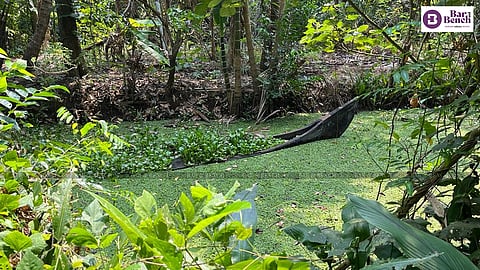
- Latest Legal News
- News
- Dealstreet
- Viewpoint
- Columns
- Interviews
- Law School
- Legal Jobs
- हिंदी
- ಕನ್ನಡ

A plea before the Gauhati High Court challenging eviction proceedings initiated against people living in the Silsako wetland area has thrown up a question over whether a law recognising the area as a wetland can be applied retrospectively. [Khireswari Saikia vs State of Assam and ors]
The Court has sought the response of the Assam government and the Guwahati Municipal Corporation in the matter.
On June 19, the bench of Chief Justice Sandeep Mehta and Justice Mitali Thakuria also issued notice to the Guwahati Metropolitan Development Authority.
The appellants before the Court have raised a grievance over the retrospective application of the Guwahati Waterbodies (Preservation and Conservation) Act, 2008.
In an earlier hearing, on June 6, the Chief Justice had expressed his dismay with the rank encroachment on Guwahati's water bodies, saying that the same cannot be allowed even from a humanitarian perspective.
He added that even conniving officials, who had turned a blind eye to the issue, need to be prosecuted.
"We cannot be swayed by this, where human beings and their greed for land just eats into the lakes, rivers, water bodies, right left and centre ... Officers who connive with them - they should be hauled up for disciplinary proceedings. We are not going to come to the aid of these people, that is for sure. There is no dispute. You have rampantly finished off the lake ... For a rank encroacher what kind of notice is required? Can there be any claim of right to encroach on a water body and can the encroacher ask that please give me notice first?" Chief Justice Mehta had remarked.
When the counsel responded that the term encroachers may not be appropriate as they had been residing on the land for decades, the Chief Justice added,
"We will not term them as settlers, sorry. It is a different matter that officials who had turned a blind eye should be prosecuted, no doubt about that. No human aspect when it comes to encroaching of water bodies, sir. Once it is a water body you have to move out, sir."
The appellant moved the Court challenging a single-judge order from March that had refused a stay on the eviction proceedings.
The plea has sought rehabilitation and compensation for over 700 families affected by the demolition drive carried out at the wetland earlier this year.
The appellants argued that the authorities could not have dispensed with the procedure of ensuring that eviction notices were served in advance.
"Would not the rule of estoppel and doctrine of legitimate expectations apply when the State has recognised long physical possession on that land? In a Constitutional and welfare state, during a fight between the right to shelter and the conservation of national resources, the rights of those at the lowest strata have to be balanced when there are alternative policies available for rehabilitation and resettlement," the appellant's counsel submitted.
The counsel added that documentary evidence like Aadhaar cards, road connections as well as letters by circle officers showed that there was a long-time settlement in the area, which the Court could not 'wash away'.
Chief Justice Mehta had, during the hearing on June 6, remarked that even the lake, being a living body, has rights that needed to be protected.
"Is the right to life only of human beings and not other living beings (like lakes)? Can a letter by circle officer be attributed to the State, is that a recognition of right by the State, sir? When it is leading to virtual extinction of a water body, probably these technicalities will not come in the way, this is our prima facie view ... lake is also a living body, has the right to survive," Chief Justice Mehta said.
The bench had taken critical note that the original revenue records of the lands in question did not reflect its status.
"Very sorry state of affairs. The [Waterbodies] Act is not prospective, it [only] declares. I am at a loss for words. In any other State, the category of land is mentioned in the revenue record. There is no need for such Acts, even," he said.
Advocate Anurag Tiwary appeared for the appellant. Advocates R Borpujari, N Das and S Bora represented the respondents.
[Read order]